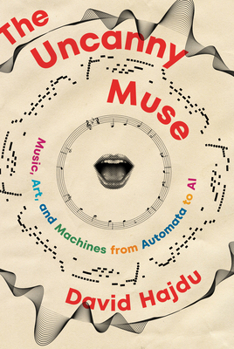The Uncanny Muse: Music, Art, and Machines from Automata to AI
What does it mean to be human in a world where machines, too, can be artists? What is this "uncanny valley," and how did we get here? As the field of art made by artificial intelligence begins to expand dramatically, questions about the role of technology in contemporary culture become ever more urgent.
In The Uncanny Muse, David Hajdu explores the history of automation in the arts, tracing the varied ways inventors and artists have sought to emulate mental processes, or fuse the mechanized world and the human soul, over the centuries. Moving from the life-size mechanical doll that made headlines by drawing pictures in Victorian London to the doll's modern-day AI counterpart, Hajdu takes a novel and contrarian approach: he sees how machines through the ages have enabled creativity, not stifled it--and sees no reason why this shouldn't be the case with AI today.





